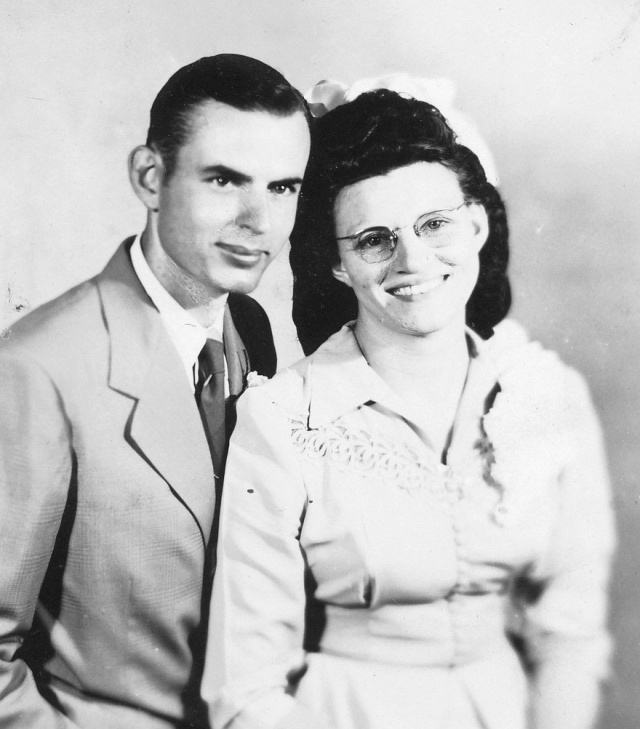HISTORY OF PASCO COUNTYLacoocheeA World War II POW FriendshipBy NELL MOODY WOODCOCK Never a word was spoken. They communicated only with scribbled notes, passed to each other when no one was watching. Thus begins a newspaper account 43 years after World War II about a girl in Lacoochee and a German prisoner of war who became silent friends as they worked at Cummer Sons Cypress Company’s mill in 1944. They were teenagers. German prisoners of war were held at a camp constructed in Dade City by the U. S. military in 1944. And they were under constant guard, prohibited from talking to any American, according to one of the prisoners. Arthur Lang told his story in a letter to a newspaper columnist long after he had left the United States and returned to his home in Ommersheim, West Germany, in March 1946. At Lang’s request in the summer of 1987, the columnist located Mildred Stephens Rosier. By then she had married Willard Rosier in 1948 when they worked at Huey O’Quinns grocery store in Lacoochee. During the war, the teen-aged Mildred was working in the crate mill with her mother Minnie Lee Stephens. Her mother was known as the “string lady” by fellow employees. She walked constantly around the crate mill and the warehouse with a bundle of “strings” on her shoulder as she tied knots in the ends of them. These strings of small rope were used to bundle the crates stored in the warehouse awaiting shipment by rail to markets around the country. Lang, the prisoner of war, worked in the warehouse and came in constant contact with crews of local men and women who worked at noisy machines in the crate mill. These machines stapled strips of cypress veneer to make the crates which were then loaded on a dolly and moved to the warehouse. My father, F. E. Moody, worked at one of these machines and Roy Scarborough was foreman of this department . It was not unusual for other teenagers to be around them. I remember Mildred, her mother, and the prisoners of war. I had just graduated from high school and was working at Cummer’s pay office where I was often dispatched to deliver messages to foremen in the mill. In such an atmosphere, friendships were easily developed between the prisoners and employees who sometimes brought them food. Lang recalled finding a banana, sometimes chocolates or a sandwich under the boards in the area where he and other prisoners worked. He thought Mildred was one of the employees who left food for them. It was food and her notes that gave him “the will to carry on” Lang recalled. “I regret it to this day that on the last day there I could not shake her hand, tell her ‘danke and auf Wiedersehen,’” Lang wrote. He was driving a German tank in France when he and his comrades were captured on June 26, 1944. They ended up as part of Company 7 at the POW camp in Dade City. He never forgot Mildred. Mildred didn’t recall taking any particular notice of Lang until one day she was leaving the mill and he came up beside her and slipped a note into her hand. She felt like she had to take it so as not to cause a scene and be noticed by people around them. “I didn’t even open my hand until I got home and got in my room. I didn’t even tell my mother.” The note was written in English. She couldn’t remember exactly what that note or the others that followed said, except to express his loneliness. After that Mildred would slip notes to Lang, but not as often as he would write to her. She was afraid of getting caught. Though the mill’s employees had become less fearful of the prisoners as they worked with them, their military guards were a serious reminder of anti-Nazi sentiment. When Lang was transferred to another part of the mill, the note passing continued by way of an undisclosed friendly mill foreman. There was never anything “suggestive” in his notes. She felt like he appreciated being noticed by someone else. And she was a religious person, a Christian; she thought he understood that. In one note he said he wanted to make her a jewelry box, but that never happened. They would acknowledge each other in passing in the mill with something resembling a salute. Both would raise a hand and brush their hair away from their foreheads. After Lang left the mill, Mildred never saw him again, except in a photograph in a local newspaper when he returned to Florida with his wife and they passed through Dade City . But he had tried to renew their friendship. One day Huey O’Quinn returned to his store where Mildred worked in 1948 and told her there was a letter from Germany waiting for her at the post office. (The typical Lacoochee “grapevine”!) Mildred went to the postoffice knowing the letter would be from Lang. In it he asked her to write to him. She didn’t respond; the war was over and she was satisfied that he was at home safe and sound. Credits: Glenda Goolsby of Ridge Manor, the daughter of Roosevelt Rosier, gave EPHS a copy of the article referred to in this story. Betty Breeden Boyett of Clay Sink confirmed the story as told by her Aunt Mildred. Betty and her deceased mother Reba Breedin were members of the female staff at the Cummer office during World War II. Claude Andrews, deceased, the office manager, served as a commissioned officer in the infantry during World War I. In WWII, because of his language skills, he was liaisons for Cummer managers and the prisoners of war. Josh Groover, deceased, the office bookkeeper, was on the list of men who drove the bus Cummer dispatched each morning to pick up the prisoners of war at the camp in Dade City and return them each evening. A copy of the newspaper article is on file with the Pioneer Florida Museum in Dade City. It has a picture of Mildred Rosier standing with her teenage friend Winita Gant in front of the warehouse. Railroad cars can be seen in the background standing on their tracks on the side of the building.  |
